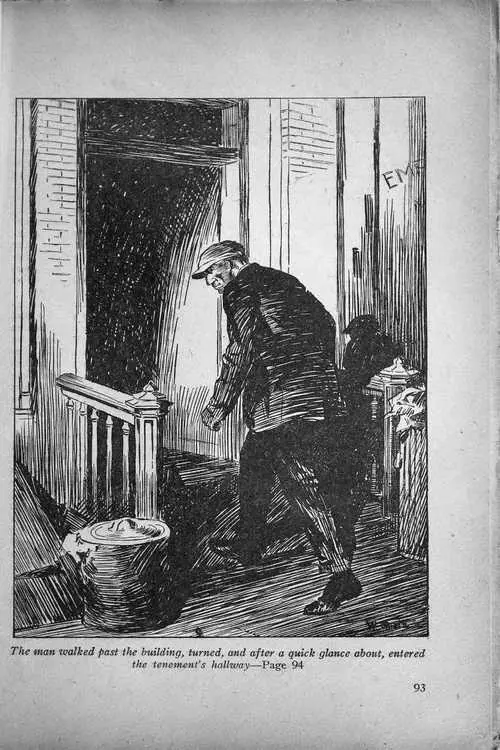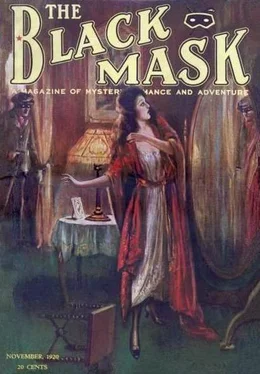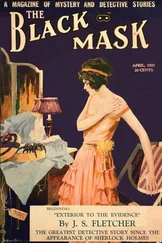Hamilton Craigie - The Black Mask Magazine (Vol. 2, No. 2 — November 1920)
Здесь есть возможность читать онлайн «Hamilton Craigie - The Black Mask Magazine (Vol. 2, No. 2 — November 1920)» весь текст электронной книги совершенно бесплатно (целиком полную версию без сокращений). В некоторых случаях можно слушать аудио, скачать через торрент в формате fb2 и присутствует краткое содержание. Город: New York, Год выпуска: 1920, Издательство: Pro-distributors Publishing Company, Жанр: Классический детектив, на английском языке. Описание произведения, (предисловие) а так же отзывы посетителей доступны на портале библиотеки ЛибКат.
- Название:The Black Mask Magazine (Vol. 2, No. 2 — November 1920)
- Автор:
- Издательство:Pro-distributors Publishing Company
- Жанр:
- Год:1920
- Город:New York
- ISBN:нет данных
- Рейтинг книги:5 / 5. Голосов: 1
-
Избранное:Добавить в избранное
- Отзывы:
-
Ваша оценка:
- 100
- 1
- 2
- 3
- 4
- 5
The Black Mask Magazine (Vol. 2, No. 2 — November 1920): краткое содержание, описание и аннотация
Предлагаем к чтению аннотацию, описание, краткое содержание или предисловие (зависит от того, что написал сам автор книги «The Black Mask Magazine (Vol. 2, No. 2 — November 1920)»). Если вы не нашли необходимую информацию о книге — напишите в комментариях, мы постараемся отыскать её.
The Black Mask Magazine (Vol. 2, No. 2 — November 1920) — читать онлайн бесплатно полную книгу (весь текст) целиком
Ниже представлен текст книги, разбитый по страницам. Система сохранения места последней прочитанной страницы, позволяет с удобством читать онлайн бесплатно книгу «The Black Mask Magazine (Vol. 2, No. 2 — November 1920)», без необходимости каждый раз заново искать на чём Вы остановились. Поставьте закладку, и сможете в любой момент перейти на страницу, на которой закончили чтение.
Интервал:
Закладка:
Under his aggressive guidance the Power House band flourished and grew opulent. The strip of territory they commanded adjoined the waterfront of the Hudson River and existed in a state of terror. Timid citizens shunned it with a shudder; the policeman that patroled it walked in the center of the streets, directing cautious glances at the housetops. When gang fights were, in progress the quarter huddled in cellars, but battles were few. The Power House gang was seldom attacked.
So long as Joe Cragen kept to his own district all went well. For a year he sat on the throne of the Power House band and ruled with a mailed fist. But there fell an evil day when in a bandit taxi he ventured into lower Manhattan. He had made plans to stick-up the paying teller of an east side bank. The plot worked easily, but the nerve of the bank employee had not been considered. In the pistol duel that resulted, Cragen feinted the teller out into the open, braved the man’s fusillade, shot him four times from the doorway, leaped back into the pirate taxi and vanished.
The same night Cragen crept through the meshes of far-flung police nets arid “rode the cushions” to Chicago, leaving the Power House gang to be broken up by the police.
II
On an August night four years after the bank stick-up, and the flight of Cragen, a lean, gray-haired individual in a rusty blue serge suit, cracked shoes and greasy.cap entered Wolger’s West Street hotel, crossed the uncarpeted lobby floor and moved to the desk that Abraham Wolger presided over, where he spoke briefly.
“How much for a flop?”
Wolger pulled the glasses up on his curved nose, rubbed a hairy ear and after plumbing his inquisitor with a long stare frowned thoughtfully.
“A quarter for the night,” he replied slowly.
The stranger produced two dimes and a nickel, wrote the name Andrew Hardy in a grimy register and was led off to one of the small, cot-adorned coops the hotel was honeycombed with, Wolger staring after him.
In the room he had rented for the night, the man who called himself Andrew Hardy closed the door and sat down on the bed. For a time he stared at the floor with narrowed eyes. Finally he took an envelope from a pocket of his shabby jacket, unfolded it and with painstaking care spilled out a quantity of something that resembled talcum powder.
He dropped it on the crease in his hand made by thumb and forefinger and sniffed it up his nose in the manner of one taking snuff.
Replacing the envelope in his pocket the man flexed his arms and sighed contentedly. He reached in a hip pocket and lifted out a small blackjack with a thong about the neck of it for the wrist. He examined it with obvious satisfaction, wet his finger and rubbed away some dark stains and small pieces of hair from its blunt, leather-covered nose. He dropped it back into his hip pocket and stared at the floor again.
Several minutes later he closed the door of the cubicle and went down into the lobby, making his way to Wolger’s desk.
“Where can I get a snifter of kick?” he inquired shortly.
As he spoke he made a peculiar sign with the thumb and little finger that was significant to the proprietor of the hotel, versed in the mute language of crookdom.
“Downstairs,” Wolger directed, frankly searching the man’s face with a puzzled expression. “First door to the left at the end of the hall.”
The one he addressed nodded and slouched away. He traversed a short hall, opened a door and descended into a basement where illicit drinks were being served to furtive faced clients by a lantern jawed waiter who wore a filthy apron.
The man seated himself at an empty table and rummaged through his pockets until he found a few pieces of silver. He laid them down on the table and waited until he attracted the attention of the waiter.
“Rye, Bill. Back me up a wash of it and never mind the water.”
A half pint of fiery moonshine was set before him. The man consumed a third of it, pulled his greasy cap well over his eyes, folded his arms and slouched back in his chair.
For ten minutes or more he sat stirless. After a while he became aware of the sound of chair legs being drawn along the cement floor; garments brushed him and presently the words of a whispered conversation drifted back to his ears.
“There’s nothing to it,” the voice of a man said. “Tip Regan looked it over and said it’s as safe as a church. The old woman locks the store up and crawls into the feathers at ten bells.”
A second voice containing a note of warning sounded.
“Soft pedal—there’s a gin hound back of you.”
Andrew Hardy, as he called himself, felt he was being intently scrutinized.
“Stewed to the scalp,” the first speaker said after a pause. “As I was saying, Tip’s got a freight as job in the Pennsy yards and is pulling silk. He passed the word to me. It looks good.”
“What’s the dope?” the other asked in guarded accents. “Where’s the store at? What time do we take a shot at it?”
There came the clink of glasses and a cough.
“It’s called the Empire Fish Market,” the first speaker resumed. “It’s up on Eleventh Avenue, corner of Forty-ninth Street. The old moll that runs it is a widow woman. She knows a pollie and a couple of big restaurants have been taking all of her fish. Tip says she’s got about two grands salted away in a drawer under the counter in the store. The old girl is foxy and has an electric bell on the drawer. She thinks that will keep it safe.”
Glasses clinked again for a minute or two.
“Sounds mighty good,” the second speaker muttered. “I’m with you. When do we start up?”
The man who called himself Andrew Hardy strained his ears.
“Not before one o’clock,” the first voice answered. “Here’s the way we go in—”
His words were drowned out by a gusty rumble of conversation from across the room; almost at once a party of men entered the basement and took chairs noisily at the table to the left of the listener.
The self-styled Andrew Hardy waited no longer. He climbed to his feet and in imitation of one very drunk lurched to the door. He threw it open with a maudlin backward glance that mentally photographed the faces of the two conspirators, closed it and hurried up and out into West Street where a young moon sailed, low, in a day-long heat haze.
A pulse of excitement began to beat within him. The hour was not quite midnight and more than sixty minutes still remained before the two men of the basement would put their plans into effect.
He fumbled in his pockets until he found a five-cent piece, turned east to the first avenue beyond and arrived in time to leap to the running board of a north bound surface car.
III
At the corner of Forty-ninth street the man alighted and turned toward the river.
The street he passed through was squalid with drab tenements marching cheek to cheek in dingy array. The gutters were filled with refuse awaiting the prowling garbage remover; the iron fire escape landings were heaped with disordered bedding upon which heat-wilted children tossed.
The street was tawdry and pallid with no single redeeming feature. Yet the man who passed along it darted eager glances to the right and left. His attitude was almost that of one returning to a beloved spot after a long absence.
On the corner of Eleventh Avenue he slowed his pace, halted altogether, and took stock of his surroundings. The junction of street and avenue was deserted save for a nocturnal stationer closing his shop; no brass buttons glinted in the lamplight—the section was wrapped in the heavy stillness of an August midnight.

With footsteps that displayed no incertitude, the man approached a fish store directly opposite from where he stood. It was one of three shops in a red brick tenement; a narrow, lightless entrance and hallway separated the fish market from the other two shops. The man walked past the building, brows drawn together, turned and after a quick glance about entered the tenement’s hallway.
Читать дальшеИнтервал:
Закладка:
Похожие книги на «The Black Mask Magazine (Vol. 2, No. 2 — November 1920)»
Представляем Вашему вниманию похожие книги на «The Black Mask Magazine (Vol. 2, No. 2 — November 1920)» списком для выбора. Мы отобрали схожую по названию и смыслу литературу в надежде предоставить читателям больше вариантов отыскать новые, интересные, ещё непрочитанные произведения.
Обсуждение, отзывы о книге «The Black Mask Magazine (Vol. 2, No. 2 — November 1920)» и просто собственные мнения читателей. Оставьте ваши комментарии, напишите, что Вы думаете о произведении, его смысле или главных героях. Укажите что конкретно понравилось, а что нет, и почему Вы так считаете.












